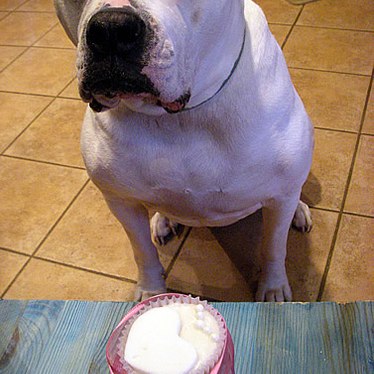Is dog-toxic xylitol beating a silent retreat?
/ Not long ago I’d regularly recommend Flintstones children’s vitamins to my dog-owning clients. I used to eat Sugar-Free Jell-O, Trident chewing gum and Tic-Tacs, too ... I also patronized Starbucks with nary a troubled thought to do with its sugar-free mints and gums. But no longer …
Not long ago I’d regularly recommend Flintstones children’s vitamins to my dog-owning clients. I used to eat Sugar-Free Jell-O, Trident chewing gum and Tic-Tacs, too ... I also patronized Starbucks with nary a troubled thought to do with its sugar-free mints and gums. But no longer …
Fast-forward five years and every veterinarian knows these products contain the extremely dog-toxic sugar substitute known as xylitol. A natural extract from the birch tree, xylitol causes severe hypoglycemia and liver necrosis –– even when surprisingly tiny quantities are inadvertently consumed.
Which wouldn’t be so scary if the product weren’t so ubiquitously included in common consumer products like gums, mints, candies, toothpaste, flavored vitamins, and plenty of sugar-free desserts. What’s even more specifically concerning to veterinarians is that xylitol is also used in sugar-free syrups that serve as vehicle for some veterinary-prescribed children’s elixirs. (We’ll sometimes enlist these when pets won’t take pills or they’re too tiny for the higher doses therein.)
But xylitol isn’t all doom and gloom. Why else would consumer product manufacturers gradually warm to it over the past decade? Its documented effects on improved dental health coupled with its impressive sweetening power are unmistakably alluring. Can’t blame the industry for going there.
Once xylitol’s effects on canine physiology became common knowledge, however, I will fault consumer product manufacturers for their failure to warn their customers. Instead of openly addressing the danger, they responded to the growing caseload of seizuring dogs in liver failure with a deafening silence.
Though we can argue ad nauseum over the merits and pitfalls of consumer labeling, one thing is clear to me and other industry watchers: When the xylitol issue arose five years ago, this sweetener’s industrial users chose not to address the issue –– at all, not even on their websites –– they demonstrated an egregious lack of corporate responsibility and missed an opportunity to prove their
Right around this time, veterinarians and animal welfare advocates began calling industry to the mat. At the time, we pointedly asked how these conglomerates could manufacture pet products that both feed and save pets, while accepting that a percentage of their human product lines would outright kill them. Here’s a smattering of my past posts on the subject:
February 14, 2008: Xylitol toxicity: Owners (and vets!) are still in the dark
November 29, 2008: Dolittler's back on the Xylitol attack! (the Rescue Remedy and Tic-Tac edition)
May 26, 2009: Xylitol kills dogs! So kill the Xylitol in YOUR diet!
February 07, 2011: Dog toxic xylitol in gums, mints, desserts ... and now drugs
Frustratingly, industry quietly refused to offer simple warnings. Instead of letting pet owners know they should never feed dogs any leftover sugar-free Sara Lee cupcakes to their pets, they buried the issue –– even as they increased the numbers of xylitol-containing products. Instead of letting pharmacists know never to dispense xylitol-containing elixirs to dogs, they stuck fast to their tight-lipped tactics.
We wrote letters to these companies, spearheaded campaigns to let Starbucks managers know about how their mints can inadvertently hurt animals, wrote letters to editors and penned a multitude of posts on the subject. We can’t expect that corporations will suddenly develop a conscience. We’ve got to let people know the dangers and slowly erode the consumer’s faith in these irresponsible conglomerates.
Meanwhile, dogs died. Even after the blogger-fueled media blitz on the subject, it’s still shocking to me how few pet owners know how deadly a stray, not-quite-empty box of Tic-Tacs can be should it accidentally spill from your teeming purse.
About a year or so, however, I started to notice a wonderful thing: Starbucks, Flintstones and Jell-O had eliminated xylitol in their products. Could it be that outing their irresponsibility had finally proved fruitful?
Though I won’t discount the possibility that the birch tree is in dire straits (or some other such mundane economic issue), I’d like to think that animal advocacy played a role in demonstrating the unsustainability of a dog killing ingredient in our increasingly pet friendly culture. Just maybe.
Disgracefully, however, not all companies have rolled back their xylitol usage.
For example, Trident’s still sweet on xylitol. Contact them to let them know you want them to stop using it unless they’re willing to offer warnings. And Pfizer? Their anti-seizure drug Neurontin (gabapentin is the generic) is killing dogs even as their animal health division still brings in the big bucks with life-saving blockbusters like Rimadyl and Cerenia. Let them know how you feel!
Indeed, let all the companies whose products still contain xylitol know that we don’t appreciate xylitol’s death toll and that we can’t abide their silence on the subject:
Here’s a list of xylitol-containing foods, health & beauty products, OTC medications and prescription drugs. (Caution: I cannot fully ascertain the list’s completeness!)
So speak up! After all, it seems to be working.
Pic: All you need is love and wedding cupcakes by cupcakequeen





